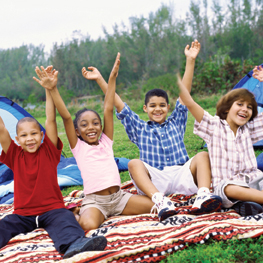
Horseback riding, canoe wars, Frisbee golf, anxiety, loneliness and stomachaches – summer camp can be a bittersweet mix of fun activities and homesick moments. Separation from parents and home is an important developmental milestone for children, but homesickness can put a real damper on a kid’s experience.
You, as a parent, are a key player in your child’s success. And while you may struggle with your own separation anxiety, you can prepare for camp alongside your child, ensuring the best possible experience for you both.
Experts weigh in here to help kids and parents get ready for camp
Choose a camp together: Does your child want to attend a camp that focuses on outdoor adventures, or would they be more comfortable exploring science and technology? Allow your child to have a say in which camp they will attend, considering how long they will be away from home and how well the activities suit their personality.
“When children are involved, even in a small way in the decision-making process, they will experience increased feelings of control,” says Frank J. Sileo, Ph.D., and author of Bug Bites and Campfires: A Story For Kids About Homesickness (Health Press, 2009). “When children feel forced, homesickness will become intensified.”
You can help your child explore camp opportunities through websites and printed materials by speaking with previous campers and by visiting the camp and the camp staff.
“A great way to help ease the mind of both parent and camper is to visit the camp before the summer session,” says Justin Castanza, Associate Camp Director of YMCA Camp Chandler. “Most camps will have Open Houses or will at least schedule a tour for camp families.”
Practice and prepare for separation: If your child has never spent time away from home, or they are anxious about leaving home, it is a good idea to practice.
“In the months before camp, make sure your child spends the night away with a friend or grandparent. This is even more important if they’ve never been away overnight before, and a good refresher if it’s been a while,” says Brian Brandt, a consultant to senior leaders of camps, non-profits and corporations at Summit Solution Groups.
Have positive actions and thoughts: Susan Hooks, director and owner of Riverview Camp, explains that parents play a crucial role in a successful camp experience.
“Positive affirmation is so important,” says Hooks. She suggests acknowledging to apprehensive children that homesickness is a normal feeling, but include encouraging words, too. “You can tell your child homesickness is okay, it’s a normal part of growing up. Then say, ‘I will pick you up on the closing day of camp. You can do it.’”
Hooks also assures parents that the camp will contact you if serious homesickness continues and, in her 29 years of camp experience, she says homesickness of that magnitude has occurred on only a few occasions.
Nervous parents should also understand that camp directors have your child’s best interest at heart. “Trust what the camp director says. We have no motive in lying. We want your child happy,” says Hooks. “If I haven’t called you, everything is fine.”
Send comforting items: Allow your child to take family photos, a stuffed animal or other reminder of home to camp so that they have a familiar item on hand.
“Kids often take pictures or articles like a stuffed animal from home to make them feel more comfortable and make their environment more homelike at camp,” says Sileo.
You can also send letters to your child. “Putting a letter from home in the suitcase or sending it before they get to camp is a wonderful, comforting idea,” says Sileo. Just remember to keep your comments positive and uplifting.
“Skip comments like, ‘I miss you so much and we’ll pick you up right away if you’re not having the time of your life,’” says Brandt. “Comments like these may have good motives, but tend to short circuit the process of the staff helping the child...”
Summer camp can be an exciting event for both parent and child, especially when both of you are prepared for a positive experience. Sileo sums it up well when he says, “Leaving home and separation from parents is a significant and important developmental milestone in a child’s life. We are their role models. They are looking to us for their sense of self and safety in the world. Hard as it may be for you as a parent, the best course of action is to smile and gently let go... Your child will be just fine and so will you.”
Ready, set, camp!
Frank J. Sileo, Ph.D., and author of Bug Bites and Campfires: A Story For Kids About Homesickness (Health Press, 2009), offers these practical tips to help prepare your child (and yourself) for camp.
• Work on letter or postcard writing skills at home. Send a supply of pre-stamped,
pre-addressed envelopes or postcards to camp with your child.
• Send a letter to your child at camp before they go so that they will receive it on their first day of camp.
• Introduce yourself and your child to someone who will be at camp.
• Support and encourage your child to make new friends and seek the support of trusted grown-ups.
• Organize practice times away from home with a friend or relative.
Julie writes about parenting and her adventures as a military spouse.
Calgary’s Child Magazine © 2024 Calgary’s Child